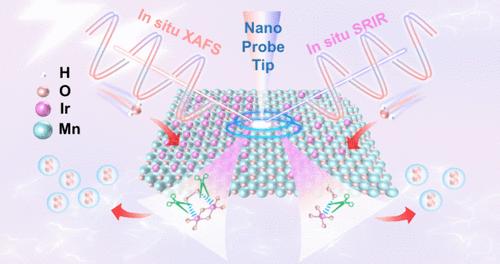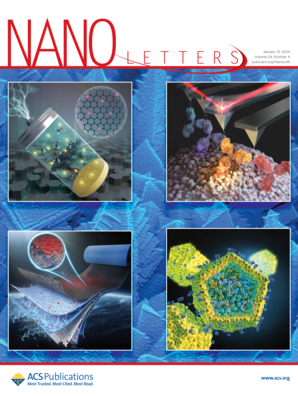揭示了酸性水氧化增强中铱位点的空间依赖协同效应
IF 9.1
1区 材料科学
Q1 CHEMISTRY, MULTIDISCIPLINARY
引用次数: 0
摘要
多相电催化中,活性位点之间的空间距离是控制羟基(*OH)基团介导的协同作用的关键因素。但是,原子尺度空间排列与协同行为、反应动力学和催化机制之间的直接实验证据仍然很少。本研究以酸性析氧反应(OER)为模型,采用原位同步辐射红外光谱技术证明了相邻活性位点能够使*OH直接偶联,形成* O-O *中间体。互补的原位x射线吸收光谱和理论计算表明,相邻的Ir位诱导电子结构调整。这种优化的电子配置有助于解锁双位点协同机制。相反,孤立的位点(距离较远)表现出*OH中间体在空间上的不可接近性,迫使通过*OOH形成更高能量的途径。这些发现为通过原子尺度空间工程操纵界面*OH动力学建立了一个通用范例,适用于多种反应,包括析氢、氧还原和CO2还原。本文章由计算机程序翻译,如有差异,请以英文原文为准。

Unveiling the Spatially Dependent Cooperative Effect in Iridium Sites for Enhanced Acidic Water Oxidation
The spatial distance between active sites is a critical factor governing hydroxyl (*OH)-group-mediated synergies in multiphase electrocatalysis. But direct experimental evidence correlating atomic-scale spatial arrangement with synergistic behavior, reaction kinetics, and catalytic mechanisms remains scarce. Using the acidic oxygen evolution reaction (OER) as a model, this study employs in situ synchrotron radiation infrared spectroscopy to demonstrate that adjacent active sites enable direct *OH coupling, forming the *O–O* intermediate. Complementary in situ X-ray absorption spectroscopy and theoretical calculations reveal that adjacent Ir sites induce electronic restructuring. This optimized electronic configuration facilitates unlocking a dual-site synergistic mechanism. Conversely, isolated sites (at a farther distance) exhibit spatial inaccessibility of *OH intermediates, forcing a higher-energy pathway via *OOH formation. These findings establish a universal paradigm for manipulating interfacial *OH dynamics through atomic-scale spatial engineering, applicable to diverse reactions including hydrogen evolution, oxygen reduction, and CO2 reduction.
求助全文
通过发布文献求助,成功后即可免费获取论文全文。
去求助
来源期刊

Nano Letters
工程技术-材料科学:综合
CiteScore
16.80
自引率
2.80%
发文量
1182
审稿时长
1.4 months
期刊介绍:
Nano Letters serves as a dynamic platform for promptly disseminating original results in fundamental, applied, and emerging research across all facets of nanoscience and nanotechnology. A pivotal criterion for inclusion within Nano Letters is the convergence of at least two different areas or disciplines, ensuring a rich interdisciplinary scope. The journal is dedicated to fostering exploration in diverse areas, including:
- Experimental and theoretical findings on physical, chemical, and biological phenomena at the nanoscale
- Synthesis, characterization, and processing of organic, inorganic, polymer, and hybrid nanomaterials through physical, chemical, and biological methodologies
- Modeling and simulation of synthetic, assembly, and interaction processes
- Realization of integrated nanostructures and nano-engineered devices exhibiting advanced performance
- Applications of nanoscale materials in living and environmental systems
Nano Letters is committed to advancing and showcasing groundbreaking research that intersects various domains, fostering innovation and collaboration in the ever-evolving field of nanoscience and nanotechnology.
 求助内容:
求助内容: 应助结果提醒方式:
应助结果提醒方式:


